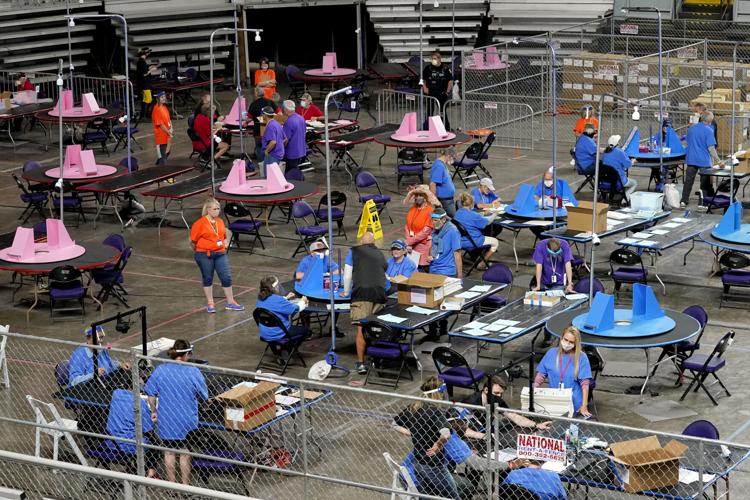If you watched the latest Jan. 6 committee hearing carefully, you could imagine a different Arizona over the last year and a half.
You could imagine a state in which political life was not dominated by a cycle of election-fraud claims made month after month, only to be debunked and replaced by new fraud claims. You could imagine a little less craziness and a little more stability.
But it didn’t happen, because of a choice Donald Trump made when he reached a crossroads on the night of Election Day 2020, the committee showed this week.
In previous weeks, internal campaign data had told Trump he might well lose, we learned from the hearing Monday. That night, his more sober advisers, such as campaign manager Bill Stepien, were telling Trump to simply tell the public that people should hold tight and wait while votes were counted.
However, Trump’s allegedly intoxicated attorney friend, Rudy Giuliani, said that anything less than claiming fraud and declaring victory would show weakness. Since Trump had been saying for months he could only lose if fraud were committed, the choice was perhaps as natural to him as it was consequential for us.
Trump went with the drunk. Arizona’s history lurched.
Trump “thought that I was wrong,” Stepien told the committee in testimony recorded earlier. “He told me so, and, you know, that they were going to go, and he was going to go in a different direction.”
That night, Trump said in a televised speech: “This is a fraud on the American public. This is an embarrassment to our country. We were getting ready to win this election. Frankly, we did win this election.”
He did not actually win the election. But just saying he had lost due to fraud convinced Trump’s devoted followers it was true while also justifying massive fundraising campaigns.
Since his devoted supporters dominate the Republican Party, and since the Republican Party still holds sway in Arizona, the whole state has been held hostage to Trump’s fateful choice on election night 2020.
Theories floated, rejected
Trump supporters protested outside the Maricopa County Elections Office on Nov. 4, 2020. That day, the first bogus theory of how the election was supposedly stolen took flight — that Sharpie pens were wrongly used in Maricopa County polling centers. It proved false. A lawsuit filed over this was quickly dropped.
And off we went, with GOP chair Kelli Ward driving the crazy train that the whole state still can’t seem to get off.
“We have the momentum, we have the activist community that is not going to allow this race to be stolen from President Trump or from Republicans all the way down the ballot,” Ward said on Nov. 5.
Soon, her party organization and the Trump campaign were filing lawsuit after lawsuit in Arizona, making overlapping claims all based on the belief that Trump could not possibly have lost Arizona legitimately, even though he was a historically unpopular president.
Among them was the idea that Dominion Voting Systems machines, used in Maricopa County, were somehow programmed or tampered with to rob Trump of votes. U.S. District Judge Diane Humetewa found the claims baseless.
“Advancing several different theories, Plaintiffs allege that Arizona’s Secretary of State and Governor conspired with various domestic and international actors to manipulate Arizona’s 2020 General Election results allowing Joseph Biden to defeat Donald Trump in the presidential race,” she wrote. “The allegations they put forth to support their claims of fraud fail in their particularity and plausibility.”
The presence here of such willingness to follow Trump into the breach dragged all of Arizona into the gutter.
State Rep. Mark Finchem, the Oro Valley Republican, organized a conference at a Phoenix hotel on Nov. 30, 2020. Rudy Giuliani attended and a crowd of self-appointed experts who would become familiar in Arizona claimed fraud had occurred here.
It helped launch the next stage of Finchem’s political career, earning him attention from Trump. Now running for Arizona secretary of state, Finchem is likely the leading candidate for the Republican nomination. At minimum he’s the leading fundraiser, having raised $939,944 so far.
It’s well known now that Trump raised $250 million after the campaign, claiming the money would go to a non-existent “election defense fund.” The Arizona GOP did something similar — raising money for itself through a so-called “Election Integrity Fund.”
Forget Jan. 6
Jump over Arizona’s involvement in the events of Jan. 6 — the planning by U.S. Reps. Paul Gosar and Andy Biggs, the Arizona Proud Boys breaching the Capitol, Finchem’s appearance at the scene — and still our political life has been dominated by the decision Trump made on Nov. 3, 2020.
State Senate President Karen Fann parted ways with House Speaker Rusty Bowers, embracing Trump’s fraud claims and launching the audit that occupied much of 2021. She hired an inexperienced and biased firm called Cyber Ninjas to carry it out. Using high-powered cameras, these inexperienced “auditors” looked for traces of bamboo in ballots — to test the story that ballots had been shipped in from somewhere in East Asia.
They found no bamboo. They found nothing of great significance.
But still the grift and the grind goes on. The latest claim to grip Trump devotees comes from the movie “2000 Mules,” which used cell phone location data to try to show that “mules” carried ballots to drop boxes repeatedly in Phoenix and elsewhere. It’s been debunked already but will undoubtedly be replaced by a new blockbuster claim soon.
Leave aside the failed coup attempt on Jan. 6, 2021, and it still has been a massive waste of Arizonans’ time, effort and money. And it all traces back to that selfish, baseless and utterly predictable decision that Trump made at the crossroads of election night 2020.







